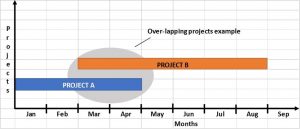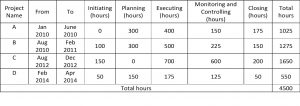Prerequisites are required when you want to take admission in a school, when you apply for a new job, when you want to conduct a training session or when you want to give a prepared talk on a subject. Similarly, there are prerequisites for PMP certification as well. Every applicant who wishes to apply for the PMP certification exam must satisfy the PMP prerequisites.
Attend our 100% Online & Self-Paced One-Hour Free PMP Training.
Do I have to satisfy PMP prerequisites?
Anyone who is an experienced project manager is expected to meet the following requirements:
- Performs duties under overall management and is solely responsible for all areas of a project throughout the life of the project.
- Leads and directs teams from different functions to deliver projects within the triple constraints of scope, schedule, budget, quality and resources
- Has knowledge and experience sufficient enough to apply a methodology to projects that have adequate and well-defined project requirements (project requirements are the needs of all the stakeholders and what are they expecting from the project)
However, these are not enough to satisfy the PMP prerequisites for PMP application. PMI will expect you to attend in a project management education course. You must demonstrate your project management experience during your application as well.
In this article, we will describe the PMP prerequisites for PMP certification one by one.
After helping over 200,000 professionals in more than 180 countries with a 99.6% first attempt pass rate, we have prepared a seven-step PMP study plan. Read this PMP study plan and create your own PMP prep plan accordingly.
What are the PMP Prerequisites?
As a project manager, you could have managed projects in your college, university or in your organization, where you are working. You might have managed many projects of different sizes and different durations. However, these are not enough to pass the PMP prerequisites.
If you satisfy the PMP prerequisites then you will be able to take the PMP test.
The table below depicts the PMP prerequisites in summary. Note that, there are “And”s and “Or”s between the cells. These are for making the PMP prerequisites clear for you. Let us explore now in detail.

And: indicates the applicant must satisfy the Educational Background, Project Management Experience and Project Management Education PMP prerequisites (as explained in the next sections of this article)
Or: indicates the applicant must satisfy either row #1 – having a secondary degree or row #2 – having four years degree row with the corresponding project management experience (explained in the next sections of this article)
As you should have noticed, 35 contact hours of formal education is common PMP prerequisite for both rows and a MUST for every PMP candidate.
Project management experience indicates time spent in leading and directing the project at a supervisory level or as a project manager and not as a team member. You don’t need to be designated as a project manager as it is the role you are asked to perform. For instance, if you are the technical engineer of a company and you are asked to participate in a project, you will have project management experience as well.
Note: There is expiry of PMP prerequisites.
The project management experience must be in the last eight years when you applied for the PMP certification. PMP education you have attended must be in the last five years when you applied for the PMP certification.
PMP Prerequisites – Row #1
It indicates that
- if an applicant has a secondary degree i.e. a high school diploma, an associate’s degree or a global equivalent
AND
- has five years or 60 months of non-overlapping project management experience (equals to 7,500 hours of working)
AND
- has attended a formal PMP training or attended a facilitation workshop of 35 contact hours.
If a candidate satisfy all these PMP prerequisites, he/she can apply for PMP certification.
PMP Prerequisites – Row #2
It indicates that
- if an applicant has a four years degree i.e. a bachelor’s degree or global equivalent
AND
- has three years or 36 months of non-overlapping project management experience (equals to 4,500 hours of working)
AND
- has attended a formal PMP course or attended a facilitation workshop of 35 contact hours.
If a candidate satisfy all these PMP prerequisites, he/she can apply for PMP certification.
In both of the PMP prerequisites row #1 and row #2mentioned above, as long as you earned the project management experience in last eight years, it is sufficient. Also, remember it does not matter whether you had a five working days in a week or six working days in a week or you worked part-time. What is considered as project management experience is how many hours you have put in initiating, planning, executing, monitoring and controlling and closing in the projects that you report in your PMP application form.

What is meant by non-overlapping project management experience?
To understand the PMP prerequisites well, you should know what a non-overlapping project management experience is. In a real project scenario, most of the time, every project manager is working on more than one project. In that scenario, there is a possibility that a project manager may work on multiple projects during a certain period of the time. We call this an over-lapping project management experience.
Please refer to the picture below.
Let us say, the PMP candidate works on Project A from January to April and on Project B from March to August. In this situation, the PMP candidate is working on two projects during March and April months. This is called over-lapping projects.
The overlapping months are indicated with an oval shape in following graphic.

For PMI, the project management experience for this case is from Jan to August. You should not count the March and April two times for each project as a separate project management experience.
Hence when you fill your PMP application form, you must ensure that you do not enter the overlapping experience. If you fill project details in your application form with over-lapping duration, then your form might be sent back to you for correction. In this case, you can submit project management experience as Project A – January to March and Project B – April to August. Please note here that we have not lost any of your working hours. We have made the project experience non-overlapping to meet the PMP prerequisites correctly. After the corrections, you may submit the form back to PMI for further processing.
What is meant by leading and directing the project?
It means leading and directing the project as identified with the tasks, knowledge and skills specific for the Project Management Professional Examination Content Outline. This outline is available on PMI’s website.
How do you count the 7,500 hours or 4,500 hours towards project management experience on projects?
Let’s look at the project management experience hours necessary for meeting the PMP prerequisites. These are the hours that you spent in one of the process groups of projects that you have worked on in the last eight years. These process groups can be initiating, planning, executing, monitoring and controlling or closing.
Let us say you have worked in four projects in the last eight years as shown below in the table:

The table contains some of the fields you will be entering while applying for the PMP certification.
When filling your application form based on your educational background details if you reach the desired number of hours, e.g. 7,500 or 4,500, then, entering further project details are not allowed. Next step will be proceeding to the other steps of application.
Open the form and check if all the PMP prerequisites have been fulfilled as per your experience. Make sure your project management experience and education details are submitted properly.

What is meant by 35 contact hours of formal education?
This one is one of the must-have PMP prerequisites. First of all, let us understand what one contact hour stands for and what does it mean?
One hour of classroom, live or online instruction equals one contact hour or one PDU (PDU stands for professional development unit).
Assume that you have completed a university or college course about project management. You attended this course for three hours per week for 15 weeks in total. For this case, you would record 45 contact hours. You must get your certificate of completion of the course from respective university or college as a proof of your 45 contact hours.
The best and efficient way of accumulating the 35 contact hours (or PDUs) to satisfy PMP prerequisite is enrolling in a PMP training online course. There are many vendors who conduct PMP facilitation workshops or programs. Be careful that the organization you will take the course is authorized to give 35 PDU’s to the participants. This can be a letter of enrollment or certificate of completion.
In short, 35 contact hours of formal education means that you have attended a formal PMP course where you have been taught or experienced all the topics from PMI’s PMBOK (Project Management Body of Knowledge). PMBOK is a PMP book of PMI and describes the fundamentals of project management. It is used for preparing for PMP certification as well.
These 35 PDUs you earned from a course will be valid for five years. If you do not sit for the PMP exam in five years, you must attend in another PMP training to satisfy the PMP prerequisites. If a new version of PMBOK is released after you completed your training, then, we recommend you to attend in an updated course to cover the changing content before your exam.
What happens after I submit my PMP application?
After the form is submitted to PMI, the filled form is reviewed by PMI reviewers. If you satisfy the PMP prerequisites, PMI will approve your application. PMI selects some of the application randomly. Regardless of the completeness of your PMP application, your application may hit PMI audit as well.
In case your application is selected for an audit, PMI may ask you to share proofs regarding the PM education you attended or project management experience. You might need to take reference letters or documents from your employer regarding your project management experience. If PMI is asking documents regarding the PM education, you can contact your PMP training provider and ask them to provide certificate of completion or letter of enrollment for the PMP program you completed.
You might be worried about the audit, but you should not, this is a normal process and the applicants are chosen randomly, so that might not mean that you don’t fulfill the PMP prerequisites.
These 35 PDU hours you will earn will be for satisfying the PMP prerequisites. Once you cleared your PMP exam, you will be a PMP in good standing for a three-year cycle. To retain your PMP credentials for the next three-year cycle, you have to start accumulating 60 PDU’s for PMP in every three years.
You can read more about PMP renewal.
What should I do if I do not meet the PMP prerequisites?
First, do not worry! You only will have to ensure that you make yourself eligible as per the PMP prerequisites described earlier in the table. It means that based on your educational background if you are falling short of hours spent on leading and directing projects then you may have to take up some new projects. You may have to wait for some time till you meet the PMP prerequisites.
OR
If you want to start your project management career right away, you can consider sitting for CAPM certification. CAPM is the entry level project management certification of PMI given to junior project management professionals. CAPM certification requirements are lighter than the PMP prerequisites. You can attend in a CAPM training and sit for the CAPM exam right after that.

